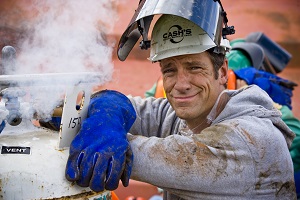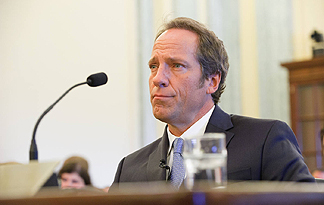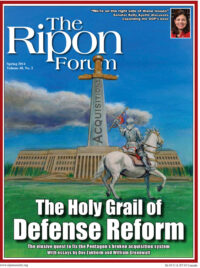
Mike Rowe spent eight seasons as the host of TV’s Dirty Jobs, where he crawled through sewers, worked on farms, and performed other unenviable tasks that most people would rather avoid.
Rowe has used that platform to champion the skills and work ethic of those who do America’s dirty work. In 2009, he established The mikeroweWORKS Foundation to support the skilled trades through various partnerships with organizations, scholarship funds, community colleges and trade schools.
He has been vocal in addressing both the skills gap in today’s workforce, and has testified at Congressional hearings about the issue. In the process, he has become a leading advocate in helping to dispel the notion that a good skilled trade job is a “vocational consolation prize.”
This fall, Rowe will host a new show on CNN called, Somebody’s Gotta Do It. As he prepares for the program’s launch, The Forum spoke with him about the lessons he has learned from our nation’s workers, his appreciation for the skilled trades, and how the definition of what constitutes a “good job” has changed over the years.
∗∗∗∗∗∗∗∗∗∗∗∗∗∗∗∗∗∗∗∗
RF: You made your name on TV performing various Dirty Jobs. What did these experiences teach you most about America’s workforce?
MR: I guess that the big lesson is that the workforce is divided, and the country is also divided with respect to our relationship with that very specific part of the workforce that keeps the lights on. The big distinction is the difference between blue and white collar. Everyone knows that exists, but the emotional gulf that exists between the two is really wider than it has ever been. And, it’s into that gulf, or that gap, that a lot of great opportunities wind up falling.
RF: Today’s society places great emphasis on the need for high-skilled jobs that require math and science backgrounds. How do you promote blue-collar skills without neglecting the importance of more advanced professions in our country?
MR: You start by acknowledging that blue collar skills are not the opposite of white collar skills. You start by making the case that they’re two sides of the same coin. Then you suggest that the further that you try to separate those two paths, the bigger the chasm you create in society and in the workforce.
Again, that is the divide – like a black hole out in the universe somewhere that sucks all sorts of great opportunities into it. It’s the perceptions we have and stigmas and the stereotypes around whole categories of jobs that fundamentally keep parents from encouraging their kids to pursue their careers. Likewise, if kids look at those same opportunities with the inertia of their parents’ influence and the pressure of their peers, then it’s not long before you start to look at whole categories of work as vocational consolation prizes – or being subordinate.
That’s why changing that basic perception requires a generational kind of public relations campaign focused specifically on that goal.
We have to step away from the notion that there is only one way to best ensure a kid’s success and happiness scholastically.
RF: As the unofficial spokesman for the working class in this country, what message are you trying to send to policy makers here in Washington?
MR: I guess the short message is that we are going to get the behavior that we reward. If we want to change the way people look at three million jobs currently available, we have to affirmatively change the perceptions that exist around those jobs. We have to challenge the bad advice we talked about before, and we have to challenge guidance counselors, parents, teachers, and a lot of well-intended people who are still telling kids “Look, this path to college, this path to a four-year degree is your best hope.”
We have to challenge the fact that the vast majority of available jobs right now don’t require a four-year degree and the vast majority of four year degrees demand that students go into debt in order to get them. We have to step away from the notion that there is only one way to best ensure a kid’s success and happiness scholastically.
RF: Politicians often times toss around the term “shovel-ready jobs” as a talking point. What are they overlooking about the kind of people who fill these positions?
MR: In general, what I believe a lot of people miss when they talk about that term is the idea that the country – all of us – no longer value the willingness to pick up a shovel. That is where the disconnect is. It’s not so much the people who do the work. It’s the relationship the rest of us have with the work and the people who do it.
When the president in 2009 first floated that expression, I remember a lot of people chuckling because they knew from a recruiting standpoint how hard it was for people to find people willing to pick up a shovel, learn a useful skill, and work very, very hard. On Dirty Jobs, while the country was in a recession, and while the headlines always seemed to focus on high unemployment, I saw “help wanted” signs everywhere I went.
Underneath that was the realization that a big chunk of the country didn’t value the kind of work and the kind of jobs that were currently for sale. And that’s the trick around “shovel ready.” The individuals who still pick up the shovel might still be ready to do it, but the country is not in a position to affirmatively encourage or value the shovel-ready worker.
RF: The mikeroweWorks Foundation has a partnership with the SkillsUSA organization to help encourage more students toward pursuing STEM career fields. What has been your biggest success story so far in this joint venture?
MR: Well, I could tell you dozens of individual stories. Kids in Kentucky, for instance, who have never been in a taxi cab, much less an airplane, suddenly finding themselves involved with SkillsUSA qualifying to go to the National Leadership and Skills Conference and being sent there by The mikeroweWORKS Foundation.
The better answer to the question, however, is a public relations campaign. The fact that my association with SkillsUSA would lead you to ask the question that you just did is the whole point. There are over 400,000 kids in this organization, and they’re doing amazing work. But if take a poll, you’re looking at two or three percent awareness. The Boy Scouts have something like 100 percent awareness.
So the biggest and best thing I can do for SkillsUSA is talk about them, because more than any other program, those guys have filled in the hole that was created when vo-tech left high school. There’s no better organization making a case for the trades directly to the kids. I love the organization.
RF: You’ve worked hard to challenge the stigmas and stereotypes of alternative education in this country. What role should government play in aiding this effort?
MR: People tend to dismiss the power and importance of good public relations, but they shouldn’t. Part of the reason it gets dismissed is because much of what passes for public relations and so much of what we see in the way of public service announcements are just terrible. They’re noisy, they all hit the same chord, and at the end of the day, who can tell the difference between 20 or 30 different PSAs all for one squishy cause or another? It all gets very confusing.
The partnerships that work are the ones that are driven by business and engage everyone. The best example I can think of is the Keep America Beautiful campaign. To fundamentally change people’s behavior, they had to change or challenge people’s relationships, they had to make it an ethical issue – “Littering is bad.”

I tend to believe the skills gap exists because we do not collectively agree in this country on the definition of a “good job.”
We need to do the same thing with work. I think the government is in a position to encourage that. That is really why I went to the Senate a few years ago and the House recently to say: Look, I get it — we’re broke. I’m not going to ask you for money. But your rolodex is enormous. Why don’t we get a couple of the Fortune 500 guys together, a couple people in the media, and a couple of agencies in the federal government that would really benefit from challenging these stereotypes in such a way that it reinvigorates the trades and makes it easier for companies who rely on a skilled workforce to recruit?
Let’s engage all of those people in a campaign modeled around the Keep America Beautiful campaign, that’s designed to change the perception around millions of good jobs that are currently available, that no one wants, while also changing the perceptions around community colleges, trade schools, apprenticeship programs and on-the-job training opportunities.
RF: Does the skills gap exist because of a lack of an abundance of proper training, or is it because this generation has a different definition of what classically-romanticized “hard work” really is?
MR: Personally, I believe the latter. But it’s a tricky question, because what it does is get right to the heart. It takes a practical problem and forces it into a polemic. This is how things get political, right? When you have 10 million people unemployed, and three million jobs that for whatever reason cannot be filled, it demands an explanation.
I tend to believe the skills gap exists because we do not collectively agree in this country on the definition of a “good job.” That definition is changing and morphing every day. I remember a couple of years ago, a Senator or Congressman from New York proposed something called the “Good Jobs Bill.” On Dirty Jobs, we just laughed at that because the people I worked with would say, “There’s no such thing as a good job or a bad job, it’s all work.” There’s nobility in all of it, and if you don’t particularly like the flavor of work you currently find yourself involved in, then there may be a thousand different ways to improve your position. None of them are easy, and most of them aren’t particularly pleasant, but that was the assumption for generations. That is no longer in play. I don’t think anybody on either side of the aisle can argue with that. Our expectations have really changed.
Even with a trillion dollars in student loans, we still cling to the idea that once you get your degree, the doors are going to open and the jobs are going to be there. It’s just not the case.
Even with a trillion dollars in student loans, we still cling to the idea that once you get your degree, the doors are going to open and the jobs are going to be there. It’s just not the case. It’s a different world and we haven’t adjusted our expectations, our platitudes, our clichés, or our standards to deal with it. Until we can agree as a country on general things — like the value of work and the definition of a good job — we’re going to spend a lot of time spinning our wheels arguing about things like the minimum wage or any one of a hundred symptoms that come out of that basic problem.
Again, I get it. That’s why the skills gap is so political. The minute you really dig down and start to talk about its causes, things get rather philosophical. As soon as things get philosophical, you begin to apply the same kind of thinking toward every major issue in the headlines today from immigration to the minimum wage to right on down the list. And once again, you’re back in a knife fight in a phone booth.
RF: And finally, what can we expect with your new show calledSomebody’s Gotta Do It?
MR: Somebody’s Gotta Do It will resemble Dirty Jobs in the sense that I’m still me in the real world and unscripted looking for people who I believe are worth meeting. It’s different than Dirty Jobs in the sense that the last show was marked by the willingness to get dirty.
Here, I’m looking for people who are on a mission, quixotic or not. I’m looking for people who, for reasons known unto them, have dedicated their life to a passion. It could be a vocation. It could also be an avocation. It could be a hobby that got completely out of hand, and it could be the guy building Stonehenge in his backyard because he wants to prove aliens didn’t do it and can show you how the ancient people used 20 people to move a rock with nothing but a stick, a rope, and some marbles. He spends a year doing this, and I want to know him. I want to see what makes him tick.
There are a lot of people like this. I’ve met a lot of them personally, and if everyone sat down and thought about it, they could probably make a list. I want to put them all together once a week and introduce the country to three or four of them at a time.
Whether they’re mad scientists or bloody do-gooders, they make me laugh and they give me hope. And I want to meet them.




